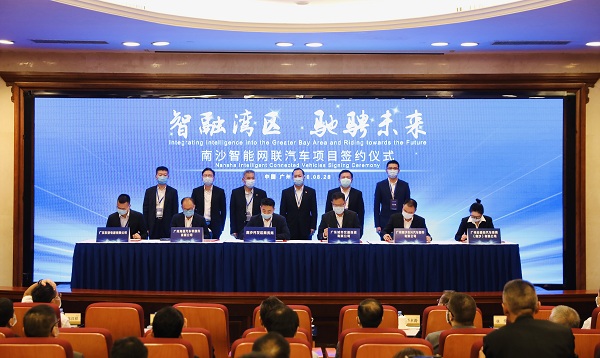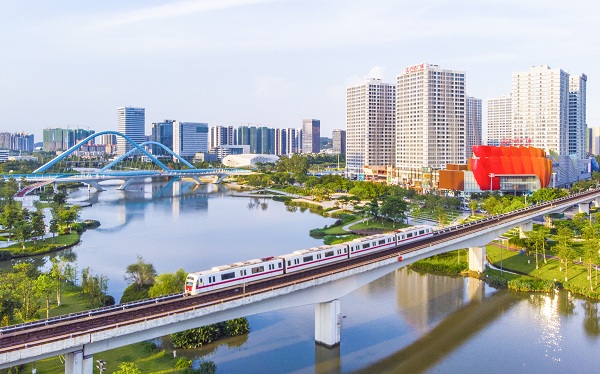Nansha takes on new projects to boost local economy

Representatives from the Nansha government and auto companies attend the signing ceremony of the projects in intelligent connected vehicles in the district on Friday. CHINA DAILY
Since the beginning of this year, Nansha district in Guangzhou, Guangdong province, has taken the construction of key projects as a vital measure to combat the COVID-19 epidemic, stabilize economic growth and boost long-term development, said local officials during a parallel forum of the Guangzhou Annual Investment Conference on Friday.
The district signed contracts for 61 projects during the forum, with a total contracted investment of 128.6 billion yuan, accounting for about 19.6 percent of total investment the city secured during the Friday conference.
At the same time, 64 projects were started, with a total investment of 107.9 billion yuan, capable of yielding an annual output of 161.4 billion yuan when in full operation.
Either the contracted investments or the capital inputs of the projects that started construction on Friday exceeded 100 billion yuan, which fully reflects the strong momentum of Nansha's economic development.
Those projects are in areas such as biomedicine, high-end manufacturing, headquarters economy, scientific innovation and artificial intelligence, cultural and creative education, urban consumption, modern agriculture and new energy vehicles.
Located in the geographic and geometric center of the Guangdong-Hong Kong-Macao Greater Bay Area, Nansha has a strong foundation and unique advantages in developing the intelligent connected automobile industry.
Nansha is one of the three major automobile industry clusters in Guangzhou, gathering leading companies such as GAC Toyota and Denso.
The automobile manufacturing industry achieved an output value of more than 115.5 billion yuan in 2019.A wharf in Nansha handled a throughput of over 1.1 million commercial vehicles in 2019, helping the Nansha Port maintain its position as the second largest port of parallel-import vehicles in the country for three consecutive years. Nansha is also one of the first areas to launch export business for used cars in the country.
"We have seized opportunities for the development of innovative industries and promoted high-quality development," said Dong Ke, district mayor of Nansha.
"It is the important period of time for Nansha to step up this year's work and it is also the golden season for the district to promote project construction."
The investments will surely inject new vitality into Nansha's rapid integration into the new development pattern of 'dual cycles'.
Nansha has also taken the lead in developing intelligent connected vehicles: GAC Nio's new brand of pure electric vehicles has been mass-produced in the first half of the year and the first phase of Evergrande's new energy vehicle project will be completed and put into production at the end of the year, which will build a new energy vehicle production base with an annual output value of 1 million yuan.
China's self-driving unicorn Pony.ai in the district has become one of the technologically strongest and most highly valued self-driving companies in China; and test roads in the district for intelligent connected vehicles account for nearly 70 percent of the total in Guangzhou.
The district also plans to build a national-level autonomous driving and intelligent transport demonstration zone to promote applications and commercial applications of intelligent connected vehicles.

The view of the Nansha district. CHINA DAILY
Liao Bing, CEO of GAC Nio New Energy Automobile Technology, said technological experiences such as intelligent driving, personalized interface display, autonomous driving and intelligent interaction have become a reality during the internet era.
"Service will become the core value of smart cars," he said. "GAC Nio is thriving in Nansha, a treasured land with a first-class business environment."
Peng Jun, founder and CEO of Chinese startup Pony.ai, said that Guangzhou is the first city in China to recognize road test permits for smart connected vehicles in other cities.
The open test road mileage of smart connected vehicles ranks among the top in the country, and it is the first to carry out large-scale and comprehensive application trials of city-level smart connected vehicles, Peng said.
Meanwhile, the infrastructure of the Mingzhu Science Park of the Chinese Academy of Sciences has been accelerated, boosting high-quality development of Nansha's science and technology industry.
When in use, the science park will help Nansha gain speed in its efforts to become an innovative highland for cutting-edge scientific research and high-tech applications in the Guangdong-Hong Kong-Macao Greater Bay Area.
All rights reserved. Presented by China Daily









